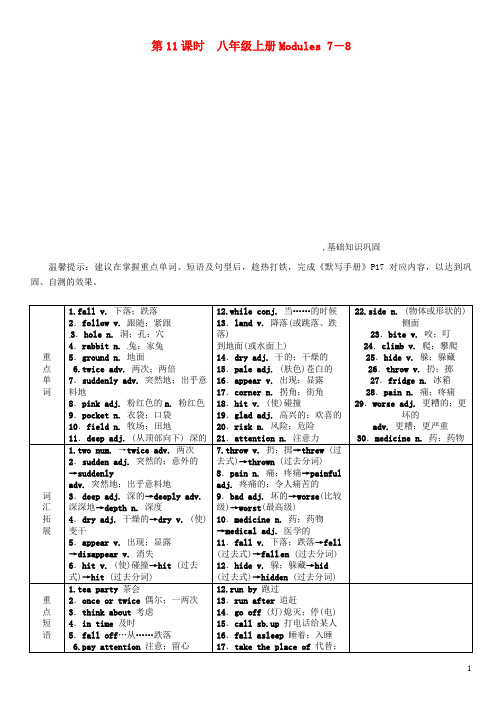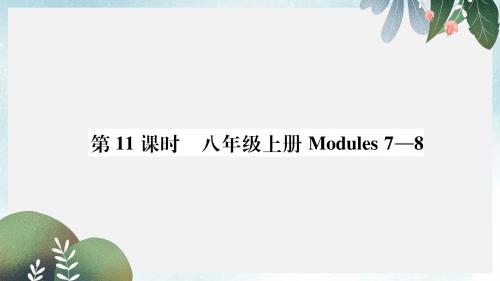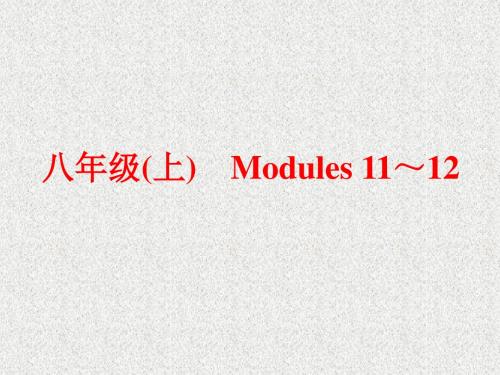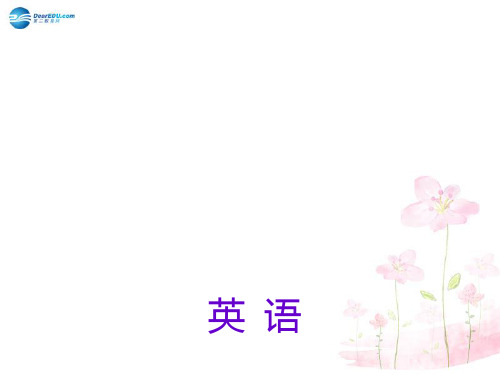【名师面对面】2015中考英语总复习 第11讲 八年级上册 Modules 11-12课件 外研版
中考英语总复习第11讲八上Modules78考点跟踪突破含13年中考真题

考点跟踪打破11初二上册 Modules 7~8根底稳固一、单项选择。
1.—Which of the two subjects do you like,art or music?—.They are really interesting.(2021,〕2.If Nancy the exam,she will go to Australia for English study.(2021,〕A.passesB.pastC.will passD.will past3.In China it is a custom to give kids lucky money,during the Spring Festival.(2021,〕4.—Thank you for your help.—.(2021,〕’s all rightB.No,thanks’s rightD.Of course5.—Guess,how much does it cost?—I think it costs fifteen and twenty dollars.6.—Why are you standing in front of the mirror with your eyes ?—Oh,I want to see when I’m asleep.A.closed;what do I look likeB.closing;how I look likeC.closed;what I look likeD.closing;what I am like7.The coffee shop isn’’s my house.A.opposite;as wellB.next;tooC.near from;as wellD.between;too8.—Excuse me,where is the nearest bus stop?—Go ,don’t turn left or turn right,you’ll find it easily.A.alongC.straight ahead9.There are many trees on side of the street.A.bothB.everyC.anotherD.the other10.I have .I’m only my son.A.nothing to say;proud ofB.something to talk;pride ofC.anything to say;the pride ofD.nothing to talk;proud of二、词汇。
浙江省中考英语总复习 第1部分 教材知识梳理篇 第11课

第11课时八年级上册Modules 7-8,基础知识巩固温馨提示:建议在掌握重点单词、短语及句型后,趁热打铁,完成《默写手册》P17对应内容,以达到巩固、自测的效果。
重点单词1.fall v. 下落;跌落2.follow v. 跟随;紧跟3.hole n. 洞;孔;穴4.rabbit n. 兔;家兔5.ground n. 地面6.twice adv. 两次;两倍7.suddenly adv. 突然地;出乎意料地8.pink adj. 粉红色的n. 粉红色9.pocket n. 衣袋;口袋10.field n. 牧场;田地11.deep adj. (从顶部向下)深的12.while conj. 当……的时候13.land v. 降落(或跳落、跌落)到地面(或水面上)14.dry adj. 干的;干燥的15.pale adj. (肤色)苍白的16.appear v. 出现;显露17.corner n. 拐角;街角18.hit v. (使)碰撞19.glad adj. 高兴的;欢喜的20.risk n. 风险;危险21.attention n. 注意力22.side n. (物体或形状的)侧面23.bite v. 咬;叮24.climb v. 爬;攀爬25.hide v. 躲;躲藏26.throw v. 扔;掷27.fridge n. 冰箱28.pain n. 痛;疼痛29.worse adj. 更糟的;更坏的adv. 更糟;更严重30.medicine n. 药;药物词汇拓展1.two num. →twice adv. 两次2.sudden adj. 突然的;意外的→suddenlyadv. 突然地;出乎意料地3.deep adj. 深的→deeply adv.深深地→depth n. 深度4.dry adj. 干燥的→dry v. (使)变干5.appear v. 出现;显露→disappear v. 消失6.hit v. (使)碰撞→hit (过去式)→hit (过去分词)7.throw v. 扔;掷→threw (过去式)→thrown (过去分词)8.pain n. 痛;疼痛→painfuladj. 疼痛的;令人痛苦的9.bad adj. 坏的→worse(比较级)→worst(最高级)10.medicine n. 药;药物→medical adj. 医学的11.fall v. 下落;跌落→fell(过去式)→fall en (过去分词)12.hide v. 躲;躲藏→hid(过去式)→hidden (过去分词)重点短语1.tea party 茶会2.once or twice 偶尔;一两次3.think about 考虑4.in time 及时5.fall off…从……跌落6.pay attention 注意;留心12.run by 跑过13.run after 追赶14.go off (灯)熄灭;停(电)15.call sb.up 打电话给某人16.fall asleep 睡着;入睡17.take the place of 代替;7.side by side 并排地;肩并肩地8.fall down 跌倒;掉下9.nothing strange 没有什么奇怪的事10.have nothing to do 无所事事11.take…out of 从……中取出,拿出接替18.talk on one's mobile phone 在手机中交谈19.pick up 拿起;捡起20.get worse 变得更糟21.in great pain 在巨大的疼痛中;疼得很厉害22.send…to…把……送往……重点句型1.It's about a girl calledAlice.(这本书)是关于一个叫爱丽丝的女孩。
中考英语总复习 第11讲 八上 Modules 78考点跟踪突破(含13年中考真题)(无答案) 外研版

考点跟踪突破11初二上册 Modules 7~8基础巩固一、单项选择。
1.—Which of the two subjects do you like,art or music?—.They are really interesting.(2013,陕西)A.NeitherB.BothC.NoneD.All2.If Nancy the exam,she will go to Australia for English study.(2013,广东)A.passesB.pastC.will passD.will past3.In China it is a custom to give kids lucky money,during the Spring Festival.(2011,丽水)A.finallyB.luckilyC.simplyD.especially4.—Thank you for your help.—.(2011,金华)A.That’s all rightB.No,thanksC.That’s rightD.Of course5.—Guess,how much does it cost?—I think it costs fifteen and twenty dollars.A.fromB.betweenC.amongD.with6.—Why are you standing in front of the mirror with your eyes ?—Oh,I want to see when I’m asleep.A.closed;what do I look likeB.closing;how I look likeC.closed;what I look likeD.closing;what I am like7.The coffee shop isn’t far.It’s my house.A.opposite;as wellB.next;tooC.near from;as wellD.between;too8.—Excuse me,where is the nearest bus stop?—Go ,don’t turn left or turn right,you’ll find it easily.A.alongB.onC.straight aheadD.up9.There are many trees on side of the street.A.bothB.everyC.anotherD.the other10.I have .I’m only my son.A.nothing to say;proud ofB.something to talk;pride ofC.anything to say;the pride ofD.nothing to talk;proud of二、词汇。
中考英语总复习第1部分教材知识梳理篇第11课时八上Modules7_8精练课件外研版

常常可见到这样的同学,他们在下课前几分钟就开始看表、收拾课本文具,下课铃一响,就迫不及待地“逃离”教室。实际上,每节课刚下课时的几分 钟是我们对上课内容查漏补缺的好时机。善于学习的同学往往懂得抓好课后的“黄金两分钟”。那么,课后的“黄金时间”可以用来做什么呢?
三、课后“静思2分钟”大有学问
我们还要注意课后的及时思考。利用课间休息时间,在心中快速把刚才上课时刚讲过的一些关键思路理一遍,把老师讲解的题目从题意到解答整个过 程详细审视一遍,这样,不仅可以加深知识的理解和记忆,还可以轻而易举地掌握一些关键的解题技巧。所以,2分钟的课后静思等于同一学科知识的课 后复习30分钟。
2019/5/23
精选最新中小学教学课件
thank
you!
ቤተ መጻሕፍቲ ባይዱ
2019/5/23
精选最新中小学教学课件
一、释疑难
对课堂上老师讲到的内容自己想不通卡壳的问题,应该在课堂上标出来,下课时,在老师还未离开教室的时候,要主动请老师讲解清楚。如果老师已 经离开教室,也可以向同学请教,及时消除疑难问题。做到当堂知识,当堂解决。
二、补笔记
上课时,如果有些东西没有记下来,不要因为惦记着漏了的笔记而影响记下面的内容,可以在笔记本上留下一定的空间。下课后,再从头到尾阅读一 遍自己写的笔记,既可以起到复习的作用,又可以检查笔记中的遗漏和错误。遗漏之处要补全,错别字要纠正,过于潦草的字要写清楚。同时,将自己 对讲课内容的理解、自己的收获和感想,用自己的话写在笔记本的空白处。这样,可以使笔记变的更加完整、充实。
外研版英语中考一轮复习八上 Modules 11-12教材考点梳理课件

答语句意“等一会儿,亲爱的。绿灯时你才能过马路。”
7.(2013· 绍兴)—I've left my keys in the meeting room.
Please________ them for me. —All right. A.buy B.paint C.wash D.fetch 【解析】考查动词辨析。由上文 “I've left my keys in 请听话者帮忙去取一下。fetch意为“去取(某物)”,符合 语境。故选D。 答案:D
【归纳拓展】 为“经验;体验” 。
experience还可用作不可数名词,意
He is a man of great experience. 他是一个经验丰富的 人。 She is a Chinese teacher with 30 years' teaching experience. 她是一位具有 30年教学经验的语文老师。
【归纳拓展】
与 trouble相关的短语:
be in trouble处于困境中 get into trouble惹上麻烦;陷入困境 have trouble with sb./sth.某人 /物有毛病 take the trouble to do sth.费力做某事
—Do you believe what he says? —Yes, it __________ be true. A. can 答案: B B. could C.has to D. need
(1)询问病人的情况时,可译为“……怎么了?”“哪 儿不舒服?” —What's wrong with you, Tom?汤姆,你怎么了? —I don't feel very well.我感觉不太舒服。 —What's wrong with your leg?你的腿怎么了? —Nothing. 没什么。
【名师面对面】2015中考英语总复习 第10讲 八年级上册 Modules 9-10课件 外研版

12.In Texas and the southeast,it is usually very hot
and sunny compared_ to other places. 与其他地方相比,德克萨斯州和东南部的天气通常 很热,阳光灿烂。
1.What's the weather like?天气怎么样? 【典例在线】 —What's the weather like today?今天天气怎么样? —It's warm and wet.又暖又湿。 【拓展精析】 What's the weather like?是询问天气情况的常用句型, 也可以用How is the weather?询问天气情况,两者可以 互换使用,意为“天气怎么样?”其回答常用It's+ sunny/cloudy/windy/rainy等。
1.one day,some day,the other day 【典例在线】 I met him in the street one day last night.上个月的某一天我 在街上遇见他了。 He will come some day.他总有一天会来的。 I met John in the street the other day.几天前我在街上遇见 了约翰。 【拓展精析】 one day和some day都指“某一天”,但some day只指“( 将来)的某一天”,用于将来时;one day既指“(将来)的某 一天”,也指“(过去)的某一天”,既可以用于将来时, 也可以用于过去时。some day也可以写成someday。the other day意思是“几天前”,用于过去时。
【名师面对面】2015中考英语总复习-第9讲-八年级上册-Modules-7-8课件-外研版

shop.
A.runs
B.to run
C.is running D.running
第十九页,共38页。
复合句)(2014,绥化)
The programme is such a boring one that many people don't like
it.
(3)The box is too high for him to__A__. A.reach B.reach it C.reaches (4)Dogs are too difficult to__C__. A.take care B.took care C.take care of D.took care of
第十七页,共38页。
1.see sb.do,see sb.doing 【典例在线】
I saw someone take away your watch.我看见有人拿了你的 手表。
He saw his mother crying when he got up this morning.他今天起 床时看见他母亲在哭。
【活学活用】
(1)Can you hear someone __C__ in the classroom?It is
Mary.(2014,威海)
A.sing B.sings C.singing D.sang
(2)I saw him __D__ across the street when I walked past the
【拓展精析】
see sb.do sth.看见某人做了某事,强调看到某人做某事的事实ห้องสมุดไป่ตู้
或做某事的全过程。
see sb.doing sth.看见某人正在做某事,强调只是看到某人 做某事的部分过程,但不强调做完或没有必要说明是否看 着做完。
【名师面对面】2015中考英语总复习-第7讲-八年级上册-Modules-3-4课件-外研版

A.How are you
B.What can I do for you
C.What's the matter with you
D.How do you like it
2.Staying at home was easier than going to the stadium.待在家比去体育馆更容易些。
10.It's/What a pity! 真遗憾! 11.The more you go jogging,the healthier you will feel. 你慢跑的次数越多,你会感到越健康。 12.What happened? 发生了什么? 13.He lives the farthest from school,so he takes the underground. 他住的离学校最远,因此他乘地铁去。 14.What's the best way to get there? 到达那里的最佳方式是什么?
15.Nobody was late,except me. 除了我之外,没有人迟到。 16.How does Tony go to school? 托尼怎样去上学? 17.He goes to school by bus too,the same as me. 和我一样,他也是乘公共汽车上学。 18.It's the fastest and the second cheapest. 它是最快和第二便宜的。 19.Have a great trip! 祝你旅途愉快!
【活学活用】
(5)I wouldn't mind __A__ a roommate.We can help
each other and save money as well.(2014,上海)
中考英语总复习 第11讲 八年级上册 Modules 1112考点

八年级上册Modules 11~12一、词汇。
A.用方框中所给单词的适当形式填空。
每词限用一次,每空限填一词。
surprised,traditional,break,medicine,different 1.Can you say some differences between British English and American English?2.To my surprise,she didn't pass the exam.3.His leg was hurt.Let's give him some medicine for help.4.Different people from different places have different traditions.5.Be careful of broken glass,it could hurt you.B.根据汉语提示填写单词。
6.Travelling around the world must be an interesting experience(经历).7.You should be serious(严肃认真的) about the project.8.An earthquake(地震) is terrible.9.The police warned(警告) us not to climb trees.It's dangerous.10.It's impossible for kids to keep clear(不和……接触的)of computers.二、语法填空。
阅读下面短文,按照句子结构的语法性和上下文连贯的要求,在空格处填入一个适当的词或使用括号中词语的正确形式填空。
The seasons in Australia are the opposite of __11__(we).When it is winter here,it's __12__ there.Australia is __13__ the south of the world.June,July and August are the winter __14__ (month).The summer is in December,__15__ and February.The north of the country is __16__ (hot) than the south.Australia's main problem is water.A large part of the country __17__ no rain at all.Sometimes there are terrible droughts in Australia.There is no rain and the grass doesn't grow __18__ (good),the farmers have to __19__ (sell) many of their sheep and many sheep die,too.It is a great disaster __20__ Australian farmers.11.ours 12.summer 13.in 14.months15.January16.hotter 17.has 18.well19.sell 20.for三、完形填空。
中考英语总复习第11讲八上Modules78考点跟踪突破含13年中考真题

考点跟踪打破11单位:乙州丁厂七市润芝学校时间:2022年4月12日创编者:阳芡明初二上册 Modules 7~8根底稳固一、单项选择。
1.—Which of the two subjects do you like,art or music?—.They are really interesting.(2021,〕2.If Nancy the exam,she will go to Australia for English study.(2021,〕A.passesB.pastC.will passD.will past3.In China it is a custom to give kids lucky money,during the Spring Festival.(2021,〕4.—Thank you for your help.—.(2021,〕’s all rightB.No,thanks’s rightD.Of course5.—Guess,how much does it cost?—I think it costs fifteen and twenty dollars.6.—Why are you standing in front of the mirror with your eyes ?—Oh,I want to see when I’m asleep.A.closed;what do I look likeB.closing;how I look likeC.closed;what I look likeD.closing;what I am like7.The coffee shop isn’’s my house.A.opposite;as wellB.next;tooC.near from;as wellD.between;too8.—Excuse me,where is the nearest bus stop?—Go ,don’t turn left or turn right,you’ll find it easily.A.alongC.straight ahead9.There are many trees on side of the street.A.bothB.everyC.anotherD.the other10.I have .I’m only my son.A.nothing to say;proud ofB.something to talk;pride ofC.anything to say;the pride ofD.nothing to talk;proud of二、词汇。
中考英语总复习第11讲八上Modules78考点跟踪突破含13年中考真题

考点跟踪打破11本卷贰O贰贰年贰月捌日编写;出题人:令狐学复;欧阳化语;令狐理总。
初二上册 Modules 7~8根底稳固一、单项选择。
1.—Which of the two subjects do you like,art or music?—.They are really interesting.(2021,〕2.If Nancy the exam,she will go to Australia for English study.(2021,〕A.passesB.pastC.will passD.will past3.In China it is a custom to give kids lucky money,during the Spring Festival.(2021,〕4.—Thank you for your help.—.(2021,〕’s all rightB.No,thanks’s rightD.Of course5.—Guess,how much does it cost?—I think it costs fifteen and twenty dollars.6.—Why are you standing in front of the mirror with your eyes ?—Oh,I want to see when I’m asleep.A.closed;what do I look likeB.closing;how I look likeC.closed;what I look likeD.closing;what I am like7.The coffee shop isn’’s my house.A.opposite;as wellB.next;tooC.near from;as wellD.between;too8.—Excuse me,where is the nearest bus stop?—Go ,don’t turn left or turn right,you’ll find it easily.A.alongC.straight ahead9.There are many trees on side of the street.A.bothB.everyC.anotherD.the other10.I have .I’m only my son.A.nothing to say;proud ofB.something to talk;pride ofC.anything to say;the pride ofD.nothing to talk;proud of二、词汇。
- 1、下载文档前请自行甄别文档内容的完整性,平台不提供额外的编辑、内容补充、找答案等附加服务。
- 2、"仅部分预览"的文档,不可在线预览部分如存在完整性等问题,可反馈申请退款(可完整预览的文档不适用该条件!)。
- 3、如文档侵犯您的权益,请联系客服反馈,我们会尽快为您处理(人工客服工作时间:9:00-18:30)。
1.What's wrong with him?他怎么了? 【典例在线】 What's wrong with you?你怎么了? What's wrong with your eyes?你的眼睛怎么了? 【拓展精析】 What's wrong with...?意为“„„怎么了?”,常用来 询问对方所遇到的麻烦事或询问某人患了何种疾病。 表示这一意义的其他常用口语表达还有: What's the matter?怎么了? What's up?出什么事了? What's the trouble?有什么麻烦吗? What happened?发生了什么事? Is there anything wrong?有什么不对劲吗?
C.surprised
D.surprises
3.had better 【典例在线】 It seems that it is going to rain.You'd better take an umbrella.似乎要下雨了,你最好带一把雨伞。
You'd better not throw the rubbish on the ground.你最好不
9.That could be harmful! 那可能会有伤害! 10.Make sure he's warm. 确保他是暖和的。 11.What's wrong with him? 他怎么了? 12.Make him comfortable. 让他舒适。
1.need 【典例在线】 All animals need clean water to drink.所有动物都需要喝干净 的水。 We need to help the animals live in peace.我们需要帮助动物和 平地生活。 The machine needs to be mended.=The machine needs mending.这机器需要修理。 —Must I finish homework today?我今天必须完成作业吗? —No,you needn't./No,you don't have to.不,没必要。
【活学活用】 (1)Will you accept my invitation? (2)I received a present just now,but I'm not going to accept it.
2.may,might,can,could,must,can't 【典例在线】 He may know.他可能知道。 The French book might be Kathy's.She studies French.这本 法语书可能是凯西的。她学法语。 It's true that some ads can be very useful.有些广告可能非常 有用,这是真的。 He could be running for exercise.他可能正在跑步锻炼。 The notebook must be Ming's.It has her name on it.这个笔记 本一定是明的。上面有她的名字。 The Tshirt can't be John's.It's much too small for him.这件 衬衫不可能是约翰的。它对他来说太小了。
10.break (v.)broke(过去式)broken(过去分词) 11.harmful (adj.)harm(n.)伤害 12.drop (v.)dropped(过去式)dropping(-ing形式) 13.keep (v.)kept(过去式)
14.clear (adj.&v.)clearly(adv.)显然地
19.have trouble doing sth.做某事有麻烦
20.in short 简而言之
1.You needn't wait! 你不必等了。
2.You can't be serious!
你不可能是认真的。 3.And you had better not cut your hair during the Spring
英 语
第11讲 八年级上册 Modules 11~12
1.toy (n.)toys(复数形式) 2.gift (n.)present(近义词)礼物 3.surprise (n.&v.)surprising(adj.)令人惊奇的surprised(adj.) 感到惊奇的 4.difference (n.)different(adj.)不同的differently(adv.)不同地 5.accept (v.)accepted(过去式) 6.tradition (n.)traditional(adj.)传统的 7.month (n.)months(复数形式) 8.serious (adj.)more_serious(比较级)most_serious(最高级) 9.gentleman (n.)gentlemen(复数形式)
【拓展精析】
surprised形容词,意为“感到惊讶的”,描述人的情绪 或状态。be surprised at sth.因某事而惊讶。
surprising形容词,意为“令人惊讶的”,描述物或事。
surprise名词,意为“惊讶”。to one's surprise出乎某人 意料之外(一般作插入语,放在句首,用逗号隔开)。 in surprise惊讶地,表示方式和态度。类似短语:in person亲自地,in silence静静地。
A.not go C.not go to A.not drunk C.not to drink B.not to go D.not to B.not drinking D.not drink
(7)You'd better __D__ the water until it has been boiled.
8.clean up 打扫干净
9.wash up 洗刷;饭后洗餐具 10.can't wait to 迫不及待
11.first aid 急救 12.at the bottom of 在„„的底部 13.lift up 抬起;提起
14.make sure确保;确认
15.warn...about... 提醒„„注意„„ 16.keep clear of不和„„太近的 17.above all 首要的是 1.
在春节那个月期间你最好不要理发。 4.I don't think I should open it now. 我认为我现在不应该打开它。
5.Anyway,the Spring Festival is still over a month away. 无论怎样,春节还有一个多月呢。 6.Afternoon tea is not a drink but a light meal at around 4 pm. 下午茶并不只是一杯饮品,而是在下午约4点钟时的便餐。 7.Once I noticed a gentleman touch a young man on the shoulder,smile politely and say... 曾经有一次我注意到一位绅士碰了碰一个年轻人的肩膀, 有礼貌地笑着说„„ 8.It is always best to check what people usually do,... 查看人们通常做什么总是最好的„„
【拓展精析】 need作实义动词,意为“需要”,其结构形式有: sb.+need+n./pron.某人需要某物; sb.+need+to do sth.某人需要做某事; sth.+need to be done=sth.need doing某事需要被做。 need作情态动词,通常用于否定句或疑问句中,后接 动词原形,无人称、时态和数的变化; needn't作为“Must...?”句式的否定回答,相当于 “...not have to”。 need还可作名词意为“需要”。
surprise动词,意为“使„„惊讶”。
【活学活用】
(4)We are__C__to hear the________result. A.surprised;surprised B.surprising;surprising C.surprised;surprising D.surprising;surprised (5)He stood there in__A__. A.surprise B.surprising
15.brave (adj.)bravely(adv.)勇敢地 16.help (n.&v.)helpful(adj.)有益的
1.for example 例如 2.for the first time 首次;初次
3.a chess set 一副国际象棋
4.do some cleaning 打扫卫生 5.bad luck 倒霉 6.shake hands 握手 7.light meal 便餐;便饭
【活学活用】
(1)—__A__?
—I have a sore throat. A.What's the matter C.What's trouble B.What's the wrong D.What's matter
(2)—Haven't seen you for ages,Mike.__C__?
—Pretty good.Everything goes well.
A.What are you doing C.How's it going B.How are you D.What's wrong.
1.accept,receive 【典例在线】 He accepted our invitation happily.他高兴地接受了我们 的邀请。 I received her photos two days ago.两天前我收到了她的 照片。 【拓展精析】 accept作接受讲时,着重指一个人的态度,表示主语 主动、情愿地接受,而且其后的宾语一般不能省略; receive一般指通过邮递等方式“收到,接到”,它强调 主语收到了(某物),但并不含有接收人是否愿意接受的 意思。
